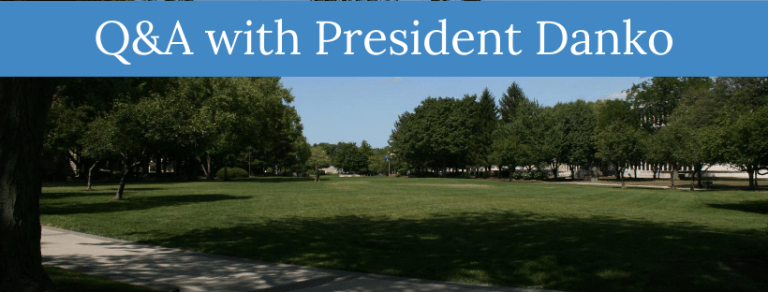MEGHAN STRATTON | EDITOR-IN-CHIEF | mrstratt@butler.edu
EDITOR’S NOTE: This is the second installment in a series of interviews with Butler University president James Danko. Each month, a new article will be published in an effort to promote transparency and accountability between students and administration. Collegian Editor-in-Chief Meghan Stratton sat down on Zoom with Butler President James Danko to discuss the details of Butler’s first week back on campus, along with what the university is doing to support anti-racism efforts.
The week of Aug. 17-23 was filled with change and uncertainty for Butler bulldogs; some students finished moving back to campus, while others opted to learn from home this semester. Nonetheless, the university announced that a spike in COVID-19 cases has led to the first two weeks of classes being conducted virtually.
Despite these challenges, Butler president James Danko described the students he’s interacted with as high energy and excited to be on campus.
“Very high energy, a lot of enthusiasm and excitement,” Danko said about campus.”It was great for me to interact with people — it really was such a good feeling after six or eight months.”
Danko also perceived the COVID-19 testing to have gone “extremely well,” considering the number of tests the university conducted. While there were varying wait times to get the required COVID-19 tests — up to a few hours — Danko said families were appreciative of the safety measures.
Procuring COVID-19 tests for the student body was a considerable outreach effort, as the tests suddenly were difficult to obtain, Danko said.
“The supply of tests across Indiana had quickly diminished, including a large supply used by the state,” Danko said. “And so we had to work pretty hard at a considerable expense overall to get that all in place, and we were very fortunate.”
However, not all went according to Butler’s health and safety plan. An email on Aug. 23 stated that classes would be moved remotely for the next two weeks due to a COVID-19 spike from 0.5% to 2%. Additionally, the email cited non-compliance with health and safety guidelines.
Danko acknowledged that the pandemic is a challenging mountain to overcome for everyone, and the health and safety restrictions go against typical human instincts to cluster — particularly after an abrupt end to the spring 2020 semester and an entire summer. Despite the difficulty, however, the president said he believes the students who held off-campus parties with approximately 20 people “knew they shouldn’t have done that.”
“I’m hearing that multiple people that were at those parties now have symptoms… ,” Danko said. “The big question is, ‘can you control those people that, no matter what, aren’t going to comply?’ If they would have complied, if they didn’t hold off campus parties, if there weren’t 20 people around somebody in particular, that had the virus, then we wouldn’t have had this problem.”
Danko said he thinks Butler has thought of all the risks and has done everything they can to mitigate them and ask for compliance. However, he acknowledged that the university can put out policies “until you’re blue in the face,” but never know how they’re going to play out in the real world.
Several students on Butler’s social media pages questioned the university’s motives for bringing students back to campus then switching to remote learning. Some even asserted this plan was only to collect room and board checks. The Collegian asked Danko what his response is to these comments.
“I think that’s just nonsense to believe that all we care about is the money,” Danko said. “People on this campus are legitimately concerned about the education of our students, and nobody is doing this for the money.”
Danko also attributed this thinking to being an easy sound bite that is part of a wider system of distrust in large institutions. He acknowledged that if anyone finds the Butler experience to be less than optimal, they can withdraw from the university and have their tuition refunded. Danko is looking into extending the tuition refund deadline until Sept. 15.
Though the pandemic is a pressing concern for all Butler community members, so too is the state of racial justice and equity nationwide. Danko asserted that Butler is doing its part to reflect and move forward through several anti-racism efforts.
Danko said he has received about 106 formal responses to his June call to action for university leaders to submit anti-racism plans. He has also appointed Terri Jett, professor of political science and special assistant to the provost for diversity and inclusivity, as a senior advisor to the president to help sort through and compile those proposals.
Additionally, Gina Forrest, director of diversity, equity and inclusion, will be educating the president’s cabinet and the board of trustees through anti-racism training, similar to the training faculty received earlier this academic year.
Danko also formed a committee tasked with a thorough review of BUPD’s role on campus. Danko said he thinks the questions surrounding the police are legitimate ones, and that this is an appropriate time for Butler to reassess its use of public safety. Danko created the task force made of faculty, staff, students and alumni that will seek to understand what BUPD is currently doing, and how those things could potentially be done better.
Antwain Hunter, associate professor of history and anthropology, and Michael Kaltenmark, director of community and government relations, will be leading the task force, which will provide recommendations directly to Danko.
The Butler Collegian will continue to follow and report on these topics.



